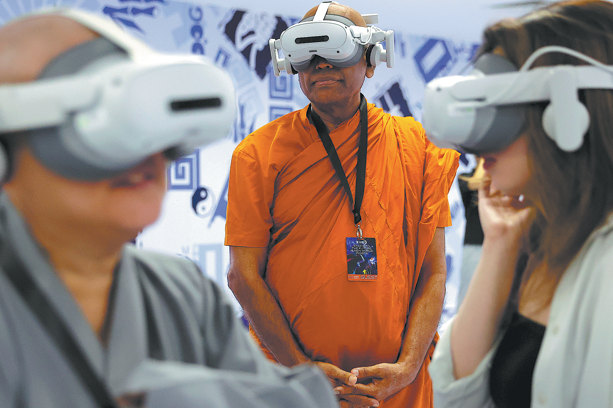English variants reflect Southeast Asia's identity awareness
By Chen Bin | China Daily | Updated: 2023-09-16 09:25

For the past decade I have been error-correcting English publicity materials of domestic and foreign exhibitors at the China-ASEAN Expo, sponsored by the command center of China-ASEAN Expo and China-ASEAN Business and Investment Summit. The findings of the past 10 years of on-the-spot inspection and corrections are as follows.
Domestically, publicity materials in the English language of exhibitors from China's coastal provinces and cities are becoming more appropriate and acceptable to the target readers than those from the inland provinces and cities.
Internationally, the publicity materials of ASEAN member states exemplify, in many cases, the Southeast Asian variants of the English language. This is evident in the publicity materials of exhibitors not only from Singapore, the Philippines, Brunei, Malaysia and Indonesia, but also from Thailand, Vietnam, Laos, Cambodia and Myanmar.
Southeast Asia is a special region characterized by linguistic diversity, in which English plays a dynamic role in intra-, inter-country and international communication. Since English is becoming the primary language of social transformation in Southeast Asia, there is considerable pressure to bridge the English language proficiency gap that exists among the member states of the Association of Southeast Asian Nations.
Countries with high levels of proficiency in English have benefited a lot due to their pragmatic and utilitarian language policy and planning, while countries with relatively low level of proficiency — due to lack of access to advanced technology — realize that their economic growth and competitiveness will be severely hampered if they do not invest in the English language. The asymmetry of proficiency in the English language in the Malay Archipelago and the Indo-China region and beyond is getting more problematic.
The number of people speaking English along with other languages or another language has increased dramatically, with the English language variants being evident in the publicity materials of the exhibitors at the China-ASEAN Expo. The publicity materials of ASEAN members show that the regional variants of English are different from one another.
Linguist Edward W. Schneider's dynamic model of postcolonial variants of the English language adopts an evolutionary perspective emphasizing language ecologies. The model shows how a language evolves as a process of "competition and selection", and how certain linguistic features emerge.
In Southeast Asia, there are substantial indicators of ongoing "nativization" of the English language, the third stage in Schneider's model, during which people construct a new identity that will have linguistic repercussions (which is happening in Brunei).
The "endonormative stabilization" stage generally follows a local linguistic norm that is accepted in formal contexts (as in the Philippines). The "differentiation" stage is evident in the Malay Archipelago countries such as Singapore, during which, as Koh Tai Ann said, the English language is like rice. In 2010, she said English is "like rice on the table, it's our common dish". Koh Tai Ann served as an associate professor in the Department of English Language, National University of Singapore.
Most of the Indo-China Peninsula countries are in the "foundation" stage, during which the English language is introduced into the colonial territory (such as in Laos), and/or the "exonormative stabilization" stage, during which users of the English language accept the external norms of educated British English (such as in Myanmar and Vietnam).
In Southeast Asia, English has undergone "decolonization" in the process of socioeconomic development and globalization, as the English language developed from the language of the colonial sovereign state to the different variants of English. This process has enriched the composition of the different variants of English, and the relationship between this persistent and profound bidirectional deconstruction and construction has created the unique tension in the dynamic process of the change of the different variants of English.
While correcting the errors in English publicity materials for the China-ASEAN Expo, we can see in the variants of English a "mistake" or an "innovation", that is to say, some usage of the Chinese English and Southeast Asian English variants, whether they be deliberate or distortion of "standard English".
The English language has the potential to go beyond the boundaries of countries and reach a global audience and "globalize the world". From the English publicity materials in the past decade, it's evident that English has become a global language because of the power that English-speaking countries hold in the world. The language has been appropriated and reshaped by people in different countries through globalization and modernization.
On the other hand, the hybridity of the Southeast Asian variants of English, projected as an innovation to resist "standard English", shows the national identity of the users. This can be viewed as a rejection of the standardization of English, the relationship between the colonizer and the colonized, and how a national identity based on language begins to manifest itself in the minds and hearts of the users of the language.
The author is a professor on foreign language studies at Guangxi University.
The views don't necessarily reflect those of China Daily.
























